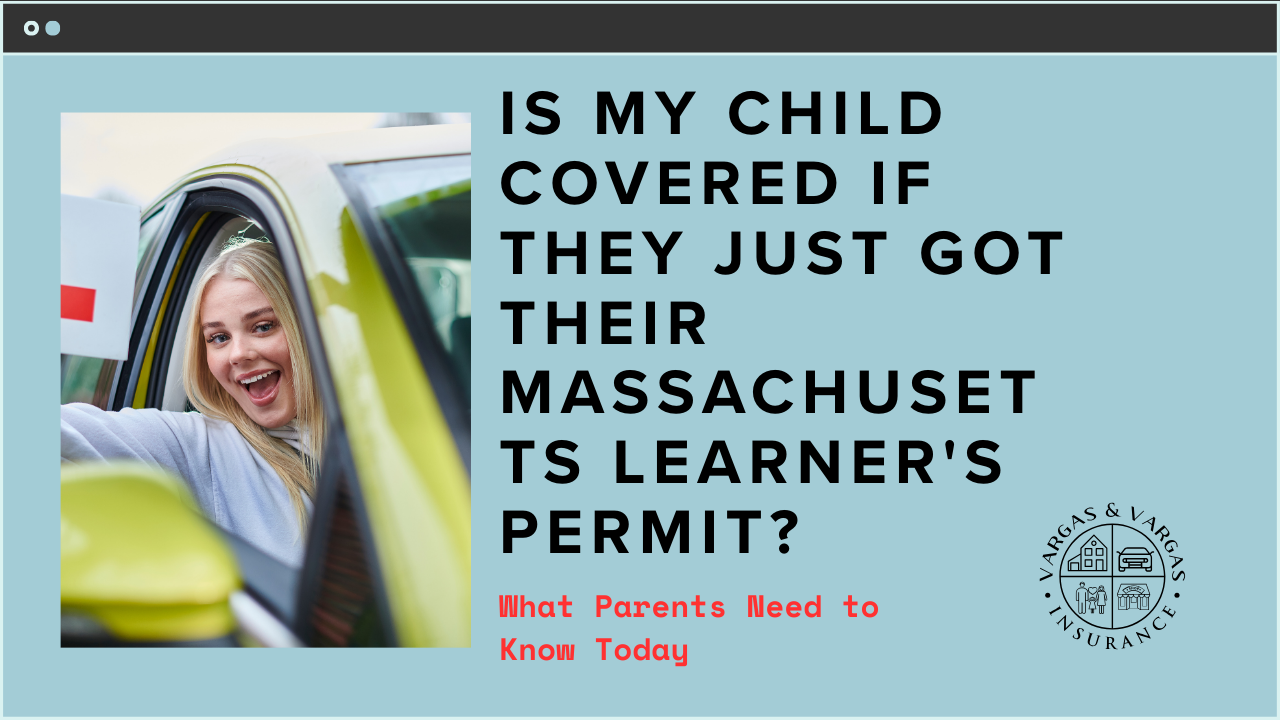Is My Child Covered If They Just Got Their Massachusetts Learner's Permit?

What’s the First Thing I Need to Know About Insurance and Learner’s Permits in Massachusetts?
As soon as your child gets their learner's permit, you might wonder: "Are they automatically covered under my auto insurance?" It's a smart—and necessary—question, and the answer isn’t as straightforward as "yes" or "no."
Do I Need to Call My Insurance Company Right Away?
Maybe. Maybe not. But if your child will be driving your vehicle—even with a learner’s permit—you need to understand the limitations and expectations of your current coverage. Ignoring this step can lead to costly mistakes in the event of an accident.
What’s the Real Story Behind Learner's Permit Coverage in Massachusetts?
In this article, we’ll clarify how coverage works for permitted drivers in Massachusetts. You'll learn when they’re typically covered, when you must add them to your policy, and the common mistakes parents make that can lead to denied claims.
Here’s What You’ll Walk Away With:
By the end of this article, you’ll know whether your child is currently protected, what actions (if any) you need to take, and how to avoid insurance gaps as they begin their driving journey.
Yes, Most Permitted Drivers in Massachusetts Are Covered—But There’s a Catch
In Massachusetts, a child with a learner’s permit is typically covered under their parent or guardian’s auto insurance policy.
That’s the good news. If your teen is driving your insured vehicle with your permission and under your supervision—as required by law—they are usually considered a “permissive user” under your existing policy. However, this default coverage relies on the assumption that:
- The child is living in your household
- They are not yet fully licensed
- They are not using the car for any commercial or unsanctioned use
Important: Some insurance companies may still require you to list your child on the policy even as a permit holder, especially once they start driving regularly.
When You Do Need to Notify Your Insurance Company
The moment your child becomes a regular driver of any of your vehicles, your insurer needs to know.
In most cases, carriers don’t require you to list a permitted driver on your policy immediately. But if your child is practicing frequently or about to test for their full license, it’s time to get in touch.
If you don’t? You risk:
- Voiding your coverage if an accident occurs
- Delays in claim processing
- Unexpected premium increases
Some insurers also offer discounts or incentives when you proactively add your permitted driver early, especially if they’ve taken a certified driver’s education course.
What Happens After They Pass the Road Test?
Once your child becomes a fully licensed driver, you must add them to your policy. In Massachusetts, insurance companies require all licensed household members of driving age to be disclosed on your policy. Failing to do so can result in denied claims, policy cancellation, or uncovered accidents.
You’ll also need to decide:
- Will they drive your car, or have their own?
- Do they need comprehensive and collision coverage?
- Should you raise your liability limits?
These decisions affect not just your premiums but your peace of mind.
Common Mistakes Parents Make with Permitted Drivers
Don’t fall into these avoidable traps:
- Assuming your insurer doesn’t need to know — Each company has different rules about when a permitted driver should be listed.
- Letting your child drive a car that isn’t listed on your policy — If your policy only covers specific vehicles, make sure they’re practicing in one of them.
- Waiting until after an accident to ask questions — At that point, it's too late to fix it.
Final Thoughts: Take These Next Steps
If you’ve been wondering, “Is my child covered now that they have a learner’s permit?”—you’re not alone. Most parents share the same uncertainty. While Massachusetts generally allows coverage for supervised permit holders under your policy, every insurance provider has slightly different requirements.
Before your child gets too comfortable behind the wheel, here’s what to do next:
- Review your auto policy or call your insurance agent today.
- Ask about rules specific to learner's permit drivers.
- Get ahead of any paperwork or policy changes before their road test.
Your next step is to read: “What Happens to My Insurance When My Teen Gets Their License?” so you can fully prepare for the transition from learner to licensed driver.
Or better yet—book a free policy review with our team to ensure your family is fully protected without overpaying.


